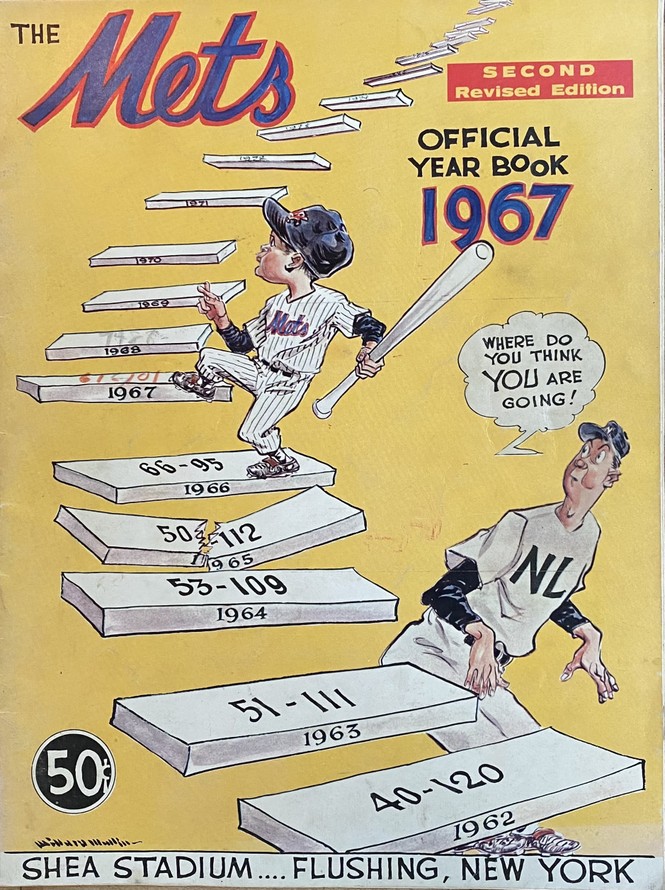For the suffering New York Mets fans of the 1960s, any sign of progress was thrilling, especially after the team’s comically bad debut season, in 1962, when it set the modern-day Major League Baseball record for losses in a single season: 120.
The optimistic cartoon on the cover of my treasured copy of the team’s 1967 yearbook seemed perfectly reasonable, within that context of relentless defeat. It pictured a pint-sized, pinstripe-uniformed Met climbing a stairway toward baseball heaven.
Each tread of the stairway was emblazoned with the team’s annual records. Only a ball club that had lost more than 100 games in its initial four years could see a record of 66–95 as a step up.
“Where do you think YOU are going!” an older figure in the cartoon, wearing a uniform symbolizing the legacy franchises of the National League, said to the apple-cheeked mini Met.
The Mets, of course, were on their way to the miracle of 1969, when, led by the golden arms of Jerry Koosman and future Hall of Famer Tom Seaver, they stunned the heavily favored Baltimore Orioles to capture the World Series.
But in Mets lore, the miracle of ’69 cannot be separated from the futility of ’62. The two seasons were like bookends, the sweetness of that improbable Series win made all the sweeter by the enormous pile of losses the team accumulated in its first year.
This is sports yin and yang, a lot like life itself—a mix of the seemingly irreconcilable opposites of pleasure and pain. Every once in a while, they fit together.
The good times seem better if you remember them through the lens of the bad times, a principle that transcends teams and grows only more potent with the passage of time and the accretion of bitter defeats.
In retrospect, the Mets’ 1969 victory, just eight years into the history of the franchise, looks like instant gratification compared with the record-setting 108-year drought that the Chicago Cubs put their fans through until they won the World Series in 2016. The same goes for the Boston Red Sox, who broke their own epic World Series drought in 2004. Football’s equivalent is the perennially losing Detroit Lions, who earlier this year thrilled their fans with playoff victories for the first time in decades.
All of these teams are defined by their history of losses as much as their breakthrough wins. As the late Cubs broadcaster Jack Brickhouse famously remarked, “Any team can have a bad century.”
So I experienced mixed emotions as this year’s inept Chicago White Sox slid inexorably toward breaking the Mets’ record, prompting some of their acerbic fans to put paper bags over their heads and wear T-shirts that said White Sux.
And I descended into sadness when the Sox finally dropped historic No. 121—sad for the erasure from the record books of a distinctive chapter in Mets’ history. But then, in their last two games, the Sox beat the Detroit Tigers, giving them a final record of 41–121.
The math nerd in me reached for a measure of salvation. Punching a few numbers into my smartphone calculator, I realized that by winning those last two games (and five of their last six), the hapless but resilient Sox had not completely “out-worsted” the ’62 Mets.
The Sox’s winning percentage turned out to be .253—dismal, yes, but slightly less dismal than the ’62 Mets’ even more dismal .250 share of victories.
Yet almost no one in the sports media took notice. Perhaps for good reason. Why weaken a strong story about the Sox’s flaming garbage dump of a season with a wonky aside about the team’s almost-but-not-quite-worst winning percentage?
Even so, it seems to me that history should add a footnote to Sox’s disastrous 2024 campaign. Yes, the Sox lost more games in a single season than any other modern-day baseball team. But no, they did not have the worst single-season winning percentage.
That dubious distinction, I’m happy to say, still belongs to the beloved ’62 Mets, who taught us an essential lesson: In sports, as in life, pleasure is inseparable from pain.




